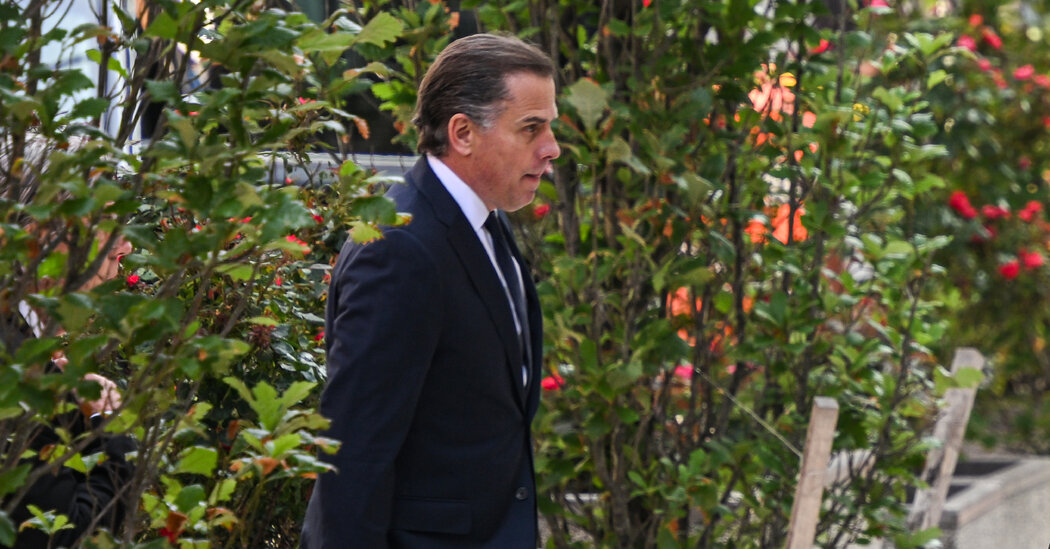Judge Maryellen Noreika kicked off Wednesday’s hearing on Hunter Biden’s proposed plea deal with the Justice Department by telling lawyers that they d
Judge Maryellen Noreika kicked off Wednesday’s hearing on Hunter Biden’s proposed plea deal with the Justice Department by telling lawyers that they did not need to keep “popping” up and down every time she asked them a question.
That was not a reflection of informality. It was a signal that she was about to subject them to three-plus hours of relentless interrogation over elements of an agreement she described, variously, as “not standard, not what I normally see,” possibly “unconstitutional,” without legal precedent and potentially “not worth the paper it is printed on.”
Judge Noreika stunned the participants with her scouring skepticism, which led her to refuse to green-light the deal until she received “more information” from both parties. An exhausted Mr. Biden trudged out of Federal District Court in Wilmington, Del., looking a bit stunned, as his lawyers puzzled over what to do next.
“You all are saying, ‘Just rubber stamp the agreement,’” said the judge. “I’m not in a position to accept or reject it. I need to defer.”
Judge Noreika quickly zeroed in on a central component of the deal, a paragraph offering Hunter Biden broad immunity from prosecution, in perpetuity, for a range of matters scrutinized by the Justice Department during its five-year investigation. The judge, appointed by former President Donald J. Trump in 2017, questioned why prosecutors had written it in a way that gave her no legal authority to reject it.
Then, in 10 minutes of incisive questioning, she exposed serious differences between the two sides on what, exactly, that paragraph meant.
Chris Clark, Mr. Biden’s lead lawyer, said it indemnified his client not merely for the tax and gun offenses uncovered during the inquiry, which was led by David C. Weiss, the U.S. attorney in Delaware, but for other possible offenses stemming from his lucrative consulting deals with companies in Ukraine, China and Romania.
Prosecutors had a far narrower definition. They saw Mr. Biden’s immunity as limited to offenses uncovered during their probe of his tax returns dating back to 2014, and his illegal purchase of a firearm in 2018, when he was a heavy drug user, they said.
When the judge asked Leo Weiss, a lead prosecutor in the case, if the investigation was still going on, he answered: “yes.”
When she asked him, hypothetically, if the deal would preclude an investigation into possible violation of laws regulating foreign lobbying by Mr. Biden connected with his consulting and legal work, he replied: “no.”
Mr. Biden then told the judge he could not agree to any deal that did not offer him broad immunity, and Mr. Clark popped up angrily to declare the deal was now “null and void.”
The 30 journalists in the gallery then witnessed a remarkable tableau of real-time, public deal-cutting, as the defense and prosecution first separated into two packs, then merged into a circle to hash out a new compromise, as Mr. Weiss, the architect of the imperiled deal, paced back and forth, jaw set and hands jammed into the pockets of his suit.
After an official recess was declared, Mr. Clark agreed to the narrower terms, and declared his previous statements “inartful.”
But Judge Noreika appeared unconvinced. She turned her attention to the fine print of the deal that had been struck on the gun offense, requiring Mr. Biden participate in a two-year diversion program that prohibited him from using drugs or owning a firearm.
She objected strenuously to a how a violation of its terms would be handled.
Typically, the Justice Department could independently verify such a breach and bring charges. But Mr. Biden’s team, concerned that the department might abuse that authority if former President Donald J. Trump was re-elected, successfully lobbied to give that power to Judge Noreika herself, arguing that she would be a more neutral arbiter.
But Judge Noreika suggested that such an arrangement could be unconstitutional because it might give her prosecutorial powers, which were vested in the executive branch by the Constitution.
“I’m not doing something that gets me outside my lane of my branch of government,” said the judge, who repeatedly complained that both sets of lawyers viewed her as a “rubber stamp” rather than someone working to make the agreement more equitable and durable.
“Go back and work on that,” she added.
www.nytimes.com
